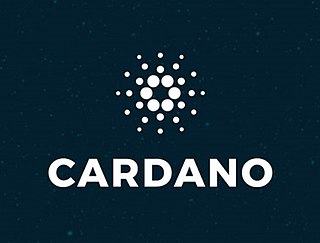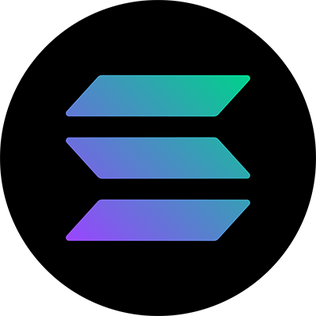
Vitaly Dmitrievich Buterin, better known as Vitalik Buterin, is a Canadian computer programmer and co-founder of Ethereum. Buterin became involved with cryptocurrency early in its inception, co-founding Bitcoin Magazine in 2011. In 2014, Buterin deployed the Ethereum blockchain with Gavin Wood, Charles Hoskinson, Anthony Di Iorio, and Joseph Lubin.

Ethereum is a decentralized blockchain with smart contract functionality. Ether is the native cryptocurrency of the platform. Among cryptocurrencies, ether is second only to bitcoin in market capitalization. It is open-source software.
A decentralized autonomous organization (DAO), sometimes called a decentralized autonomous corporation (DAC), is an organization managed in whole or in part by decentralized computer program, with voting and finances handled through a blockchain. In general terms, DAOs are member-owned communities without centralized leadership. The precise legal status of this type of business organization is unclear.
A decentralised application is an application that can operate autonomously, typically through the use of smart contracts, that run on a decentralized computing, blockchain or other distributed ledger system. Like traditional applications, DApps provide some function or utility to its users. However, unlike traditional applications, DApps operate without human intervention and are not owned by any one entity, rather DApps distribute tokens that represent ownership. These tokens are distributed according to a programmed algorithm to the users of the system, diluting ownership and control of the DApp. Without any one entity controlling the system, the application is therefore decentralised.

Cardano is a public blockchain platform. It is open-source and decentralized, with consensus achieved using proof of stake. It can facilitate peer-to-peer transactions with its internal cryptocurrency, ADA.
An initial coin offering (ICO) or initial currency offering is a type of funding using cryptocurrencies. It is often a form of crowdfunding, although a private ICO which does not seek public investment is also possible. In an ICO, a quantity of cryptocurrency is sold in the form of "tokens" ("coins") to speculators or investors, in exchange for legal tender or other cryptocurrencies such as Bitcoin or Ether. The tokens are promoted as future functional units of currency if or when the ICO's funding goal is met and the project successfully launches.
Genius is an American digital media company founded on August 27, 2009, by Tom Lehman, Ilan Zechory, and Mahbod Moghadam. Its website serves as an online music encyclopedia allowing users to provide annotations and interpretation to song lyrics, news stories, sources, poetry, and documents.
EOS.IO is a blockchain protocol based on the cryptocurrency EOS. The smart contract platform claims to eliminate transaction fees and also conduct millions of transactions per second. It was developed by the private company Block.one and launched in 2017. The platform was later released as open-source software.

CryptoKitties is a blockchain game developed by Canadian studio Dapper Labs. The game allows players to buy, sell, and create non-fungible tokens (NFTs) using on Ethereum. These NFTs represent virtual cats. The game's popularity in December 2017, congested the Ethereum network, causing it to reach an all-time high in the number of transactions and slowing it down significantly.
Video games can include elements that use blockchain technologies, including cryptocurrencies and non-fungible tokens (NFTs), often as a form of monetization. These elements typically allow players to trade in-game items for cryptocurrency, or represent in-game items with NFTs. A subset of these games are also known as play-to-earn games because they include systems that allow players to earn cryptocurrency through gameplay. Blockchain games have existed since 2017, gaining wider attention from the video game industry in 2021. Several AAA publishers have expressed intent to include this technology in the future. Players, developers, and game companies have criticized the use of blockchain technology in video games for being exploitative, environmentally unsustainable, and unnecessary.

A non-fungible token (NFT) is a unique digital identifier that is recorded on a blockchain and is used to certify ownership and authenticity. It cannot be copied, substituted, or subdivided. The ownership of an NFT is recorded in the blockchain and can be transferred by the owner, allowing NFTs to be sold and traded. NFTs can be created by anybody and require few or no coding skills to create. NFTs typically contain references to digital files such as artworks, photos, videos, and audio. Because NFTs are uniquely identifiable, they differ from cryptocurrencies, which are fungible.

Sam Hamidi-Kazemian is an Iranian-American software programmer. He is the founder of Frax Finance, a decentralized stablecoin cryptocurrency protocol. Previously, he co-founded Everipedia, a for-profit, wiki-based online encyclopedia. He founded Everipedia with Theodor Forselius in December 2014 and later served as its President. In 2019, he began development of Frax, a fractional stablecoin cryptocurrency. As of January 2022, Frax is ranked the 5th largest stablecoin by market capitalization according to cryptocurrency ranking website Defipulse.com.

Mahbod Moghadam was an American internet entrepreneur. In 2009, he, Tom Lehman and Ilan Zechory co-founded Rap Genius, a website on which users can submit annotations and interpretations of song lyrics and other content. In 2015, he, Sam Kazemian and Theodor Forselius co-founded Everipedia, a wiki-based online encyclopedia, where he worked as the Chief Community Officer for several years. After leaving Everipedia, he became an entrepreneur-in-residence at the venture capital firm Mucker Capital, then worked on HellaDoge, a cryptocurrency-based social network.

Theodor "Tedde" Mauritz Forselius is a Swedish computer programmer and internet entrepreneur from Jönköping, Sweden. He is best known as the co-founder and Chief Executive Officer of Everipedia.

TRON is a decentralized, blockchain-based operating system with smart contract functionality, proof-of-stake principles as its consensus algorithm and a cryptocurrency native to the system, known as Tronix (TRX). It was established in March 2014 by Justin Sun and since 2017 has been overseen and supervised by the TRON Foundation, a non-profit organization in Singapore, established in the same year. It is open-source software.
Decentralized finance offers financial instruments without relying on intermediaries such as brokerages, exchanges, or banks by using smart contracts on a blockchain, mainly Ethereum. DeFi platforms allow people to lend or borrow funds from others, speculate on price movements on assets using derivatives, trade cryptocurrencies, insure against risks, and earn interest in savings-like accounts. DeFi uses a layered architecture and highly composable building blocks. Some applications promote high-interest rates but are subject to high risk. Coding errors and hacks have been common in DeFi.

MetaMask is a software cryptocurrency wallet used to interact with the Ethereum blockchain. It allows users to access their Ethereum wallet through a browser extension or mobile app, which can then be used to interact with decentralized applications. MetaMask is developed by ConsenSys Software Inc., a blockchain software company focusing on Ethereum-based tools and infrastructure.

CryptoPunks is a non-fungible token (NFT) collection on the Ethereum blockchain. The project was launched in June 2017 by the Larva Labs studio, a two-person team consisting of Canadian software developers Matt Hall and John Watkinson. The experimental project was inspired by the London punk scenes, the cyberpunk movement, and electronic music artists Daft Punk. The crypto art blockchain project was an inspiration for the ERC-721 standard for NFTs and the modern crypto art movement, which has since become a part of the cryptocurrency and decentralized finance ecosystems on multiple blockchains.

Solana is a blockchain platform which uses a proof-of-stake mechanism to provide smart contract functionality. Its native cryptocurrency is SOL.













